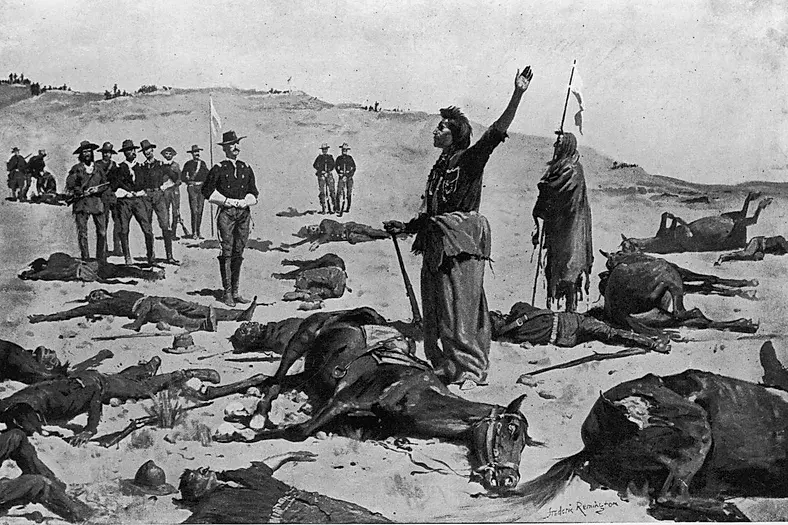The destruction of the Native American people by the US.

The establishment of the United states of America was an unmitigated disaster for North America's native people. European settlers who arrived in North America found it filled with diverse, long-established societies. They may well have become sovereign nation-states had the settlers, and later the United States, not sought to purge them from their lands, deny them self-rule, and, once they had been reduced to a tiny minority, forcibly assimilate them and their land.
In fact it was the British who stopped the American western expansion when they forbade American colonists to expand westward in 1763, in native American lands, with the "Proclamation act". One of the main reasons for the war of American independence wasn't about independence, sovereignty or taxation without representation, but land, especially to the west of the 13 colonies. The "Proclamation act" forbade all settlement west of a line drawn along the Appalachian Mountains, which was delineated as an Indian Reserve. American settlers throughout the various colonies were filled with indignation at having been unjustly shut out of the vast western wilderness and away from its resources. But once the USA won its independence the proclamation line was annulled, and western expansion was pursued with vengeance.The United States' relentless westward expansion came at the expense of their land, freedom, and often their lives — a mass displacement that, as this animated map shows, happened over an astonishingly brief period of time.
Diseases that were carried by the European immigrants into North America were, by far, the number one killer of the Native American population. But many Native American people also died because of the wars that the US federal government waged against them. Wars that were fueled by the unquenchable greed and desire of the American colonists and their government for the native American's lands and resources. From 1784 to the War of 1812, tribal displacement was limited compared to what would come. Eastern tribes were well organized and the demand for land by American colonists was moderate. But after the 1812 war between the US and the British empire that situation changed, and American expansion to the west of North America, and deeper into Native American territory, assumed a new and terrifying ferocious pace. The United States moved west, rapidly, forcing out native communities, often violently. Instead of ceding parts of their claim, Indians found themselves confined to small reserves while the remainder of their land was open to American settlement. It was common practice for Americans to ask native peoples where their lands were, and then demand part or all of it after they had firmly established the size of the holding.Between 1810 and 1895, America gobbled up the continent through deceptive negotiating tactics and brute military force. By the time the US passed the Dawes Act in 1887, effectively abolishing tribal self-governance and forcing assimilation, there was very little left of native American land, or Native Americans for that matter.

A painting of an Indian Chief surrendering to US army. By the time president Calvin Coolidge signed the "Indian citizenship act" in 1924 and conferred citizenship on all the Native Americans who still lived in the US, only a couple of hundreds of thousands of Native Americans, out of a population of up to 18 million had who lived in North America before the formation of the US, survived the European and American occupation of their lands. By that time, the Native American's once vast ancestral lands where they used to roam and live for thousands and thousands of years, had been reduced to tiny isolated reservations. The Native Americans that did manage to survive the almost century long wars, diseases, famines, and dispossession from their ancestral lands were shunted to minuscule reservations, many of which remain impoverished today, while their once vast ancestral lands in north America, were now the property of the United States of America government and the American people. Bibliography - "Indian Land cessions." Sam B. Hilliard. "Guns, Germs, and Steel." by Jared Diamond. "Born to Die: Disease and New World Conquest." by Noble David Cook.























